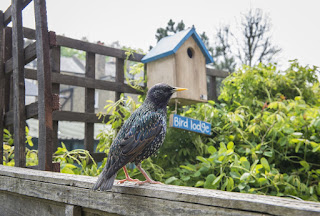 |
| Birdwatch Sparrows Ben Hall |
· Spending an hour watching the birds in your garden this weekend will help provide the RSPB with an annual snapshot of the UK’s garden birds as more than half-a-million people take part in Big Garden Birdwatch.
· Getting involved in the world’s largest garden wildlife survey is easy – simply spend an hour counting the birds that visit your garden and submit your results online.
· Some resident British birds such as greenfinches, chaffinches, blue tits, great tits and long-tailed tits should be showing in good numbers after a positive breeding season and favourable winter weather conditions.
The RSPB’s Big Garden Birdwatch is set to bring more than half-a-million people together this weekend (27, 28 and 29 January) as people uncover what is happening in their garden, helping to create an annual snapshot of how UK birds are doing.
Now in its 39th year, the Birdwatch is a chance for people of all ages to count the number of birds that visit their garden, to help the RSPB build up a picture of how our feathered friends are doing at this time of year.
Last year close to half-a-million people across the UK took part, including almost 6000 in Merseyside,making Big Garden Birdwatch the world’s biggest wildlife survey. Last year house sparrow was top of the list in the county, along with some other familiar species like robin, blackbird and starling in the top 10.
This year the RSPB is curious to see how these figures will change following a positive year for some of our resident British birds, such as greenfinches, chaffinches, blue tits, great tits and long-tailed tits. Numbers of greenfinches have been impacted by Trichomonosis for the last decade and the disease has been documented in other garden birds, such as chaffinches. More recently there was a downward trend in Big Garden Birdwatch sightings of the different tit species, which was thought to be linked to the prolonged wet weather in the 2016 breeding season.
However, the 2017 season appeared to be a good one for these resident birds which has fuelled speculation that this year could be a bumper weekend of sightings.
Daniel Hayhow, RSPB Conservation Scientist, said: “At this time of the year your garden has the potential to be a vital source of food and shelter for the garden birds we all know and love, from the flock of starlings at the feeder to the robin perched on the fence. The Big Garden Birdwatch is all about enjoying the wildlife that comes to you and it’s really as simple as spending an hour looking out the window. You don’t need any special equipment, although a cup of tea or coffee and a slice of cake might be helpful. At the end of your hour, send us your results to tell us what you saw.”
 |
| Long tailed tit John Bridges |
“This year could be a bumper weekend of sightings for some of our resident British birds. Conditions during the breeding season were much better compared to recent years and our resident birds are likely to have been further helped by relatively kind autumn and winter weather. So keep your eyes peeled for the greenfinches, chaffinches and various tit species.”
With results from gardens from all corners of the UK, the RSPB is able to use the valuable data to build up a snapshot of the birds that are reliant on the food, water and shelter that can be found in our outdoor spaces at this time of the year. When combined with 38 years of data from previous Birdwatches, it allows the RSPB to monitor trends and understand which birds are struggling and are in need of our help.
The RSPB is also asking about the other wildlife seen in gardens over the last year, such as badgers, foxes, grey squirrels, red squirrels, muntjac deer, roe deer, frogs and toads, to help build an overall picture of how important gardens are in giving nature a home.
To take part in the
RSPB Big Garden Birdwatch 2018, simply spend an hour over the weekend watching the birds in your garden, outdoor space or local park. Once you have recorded the birds that make a visit, whether it’s a sparrow, starling or siskin, submit your results online at
www.rspb.org.uk/birdwatch.
Big Schools Birdwatch has been taking place in schools across the UK since the first week of January. Running until 23 February, it is a chance for children to put down their books and get outside to experience and learn about the nature that lives in their local community. To take part visit
www.rspb.org.uk/schoolsbirdwatch
 |
| Nature's home Starling Eleanor Bentall |
This table shows the top 10 birds seen in Merseyside gardens in 2017:
Species
|
Average number per garden
|
Rank
|
% gardens seen
|
House sparrow
|
3.2
|
1
|
53.8
|
Blackbird
|
2.8
|
2
|
91.2
|
Starling
|
2.7
|
3
|
36.3
|
Woodpigeon
|
2.4
|
4
|
81.8
|
Blue tit
|
2.1
|
5
|
74.2
|
Goldfinch
|
1.8
|
6
|
33.8
|
Magpie
|
1.7
|
7
|
66.2
|
Robin
|
1.5
|
8
|
86.3
|
Great tit
|
1.3
|
9
|
54.1
|
Feral pigeon
|
1.2
|
10
|
26.2
|




